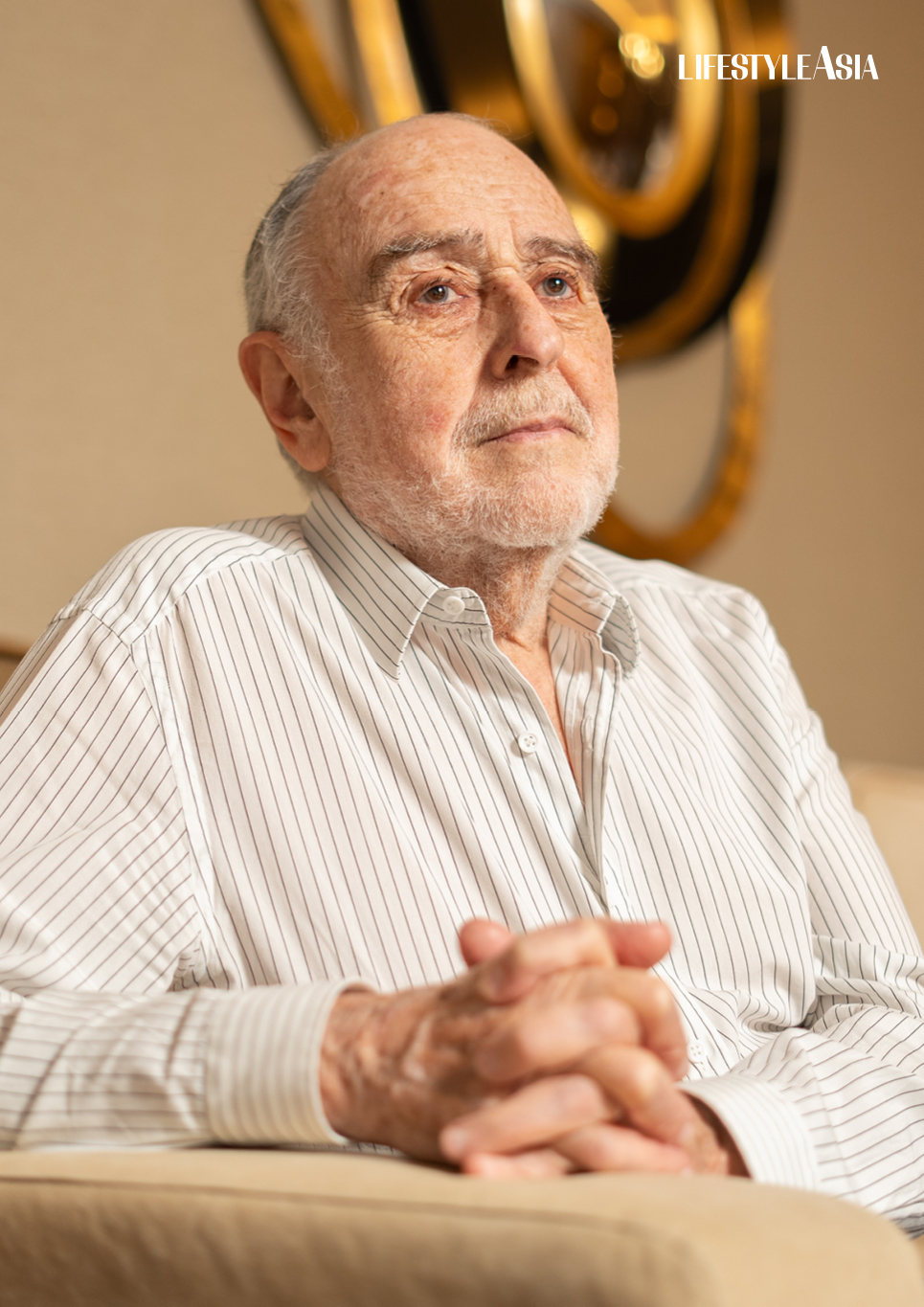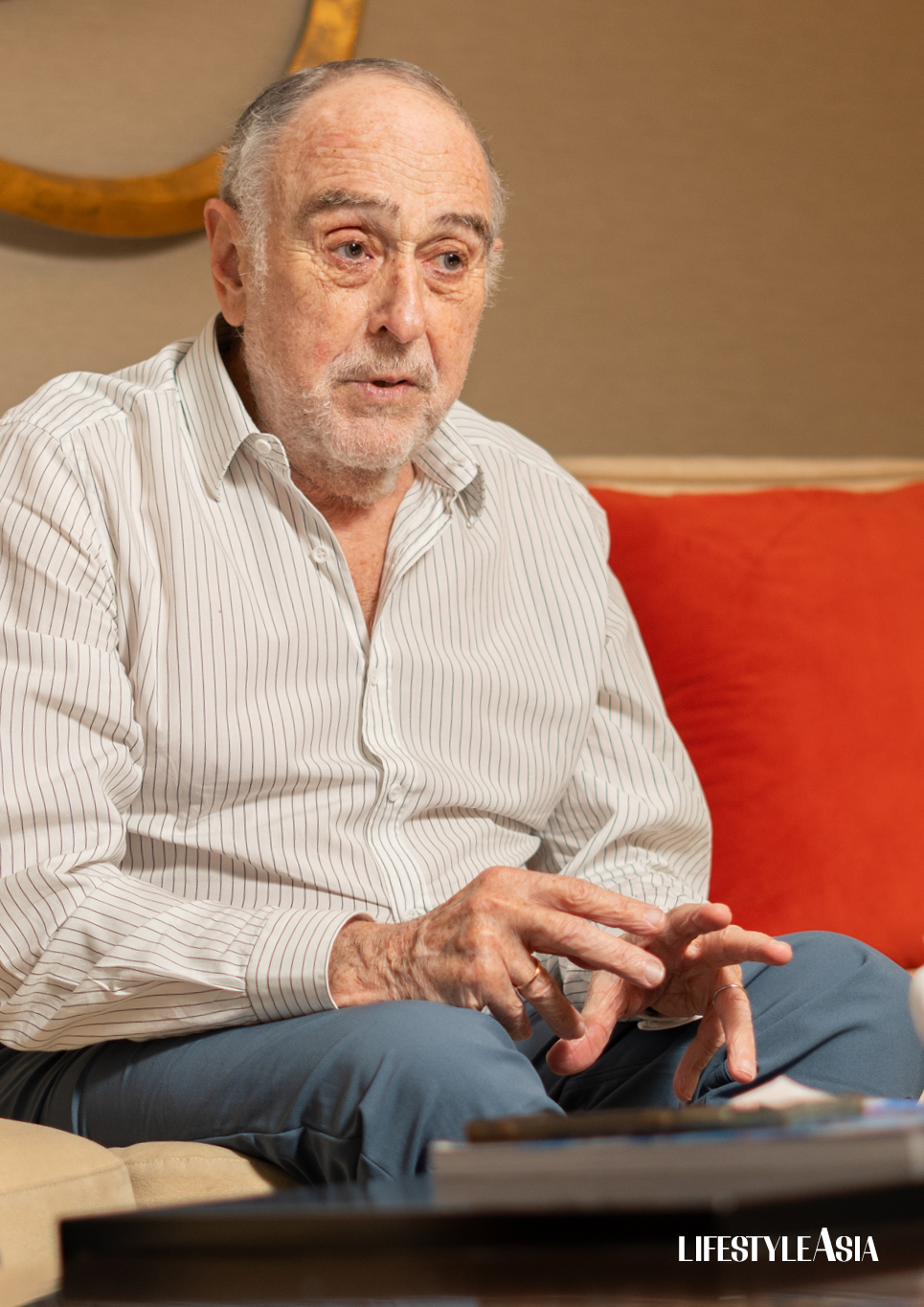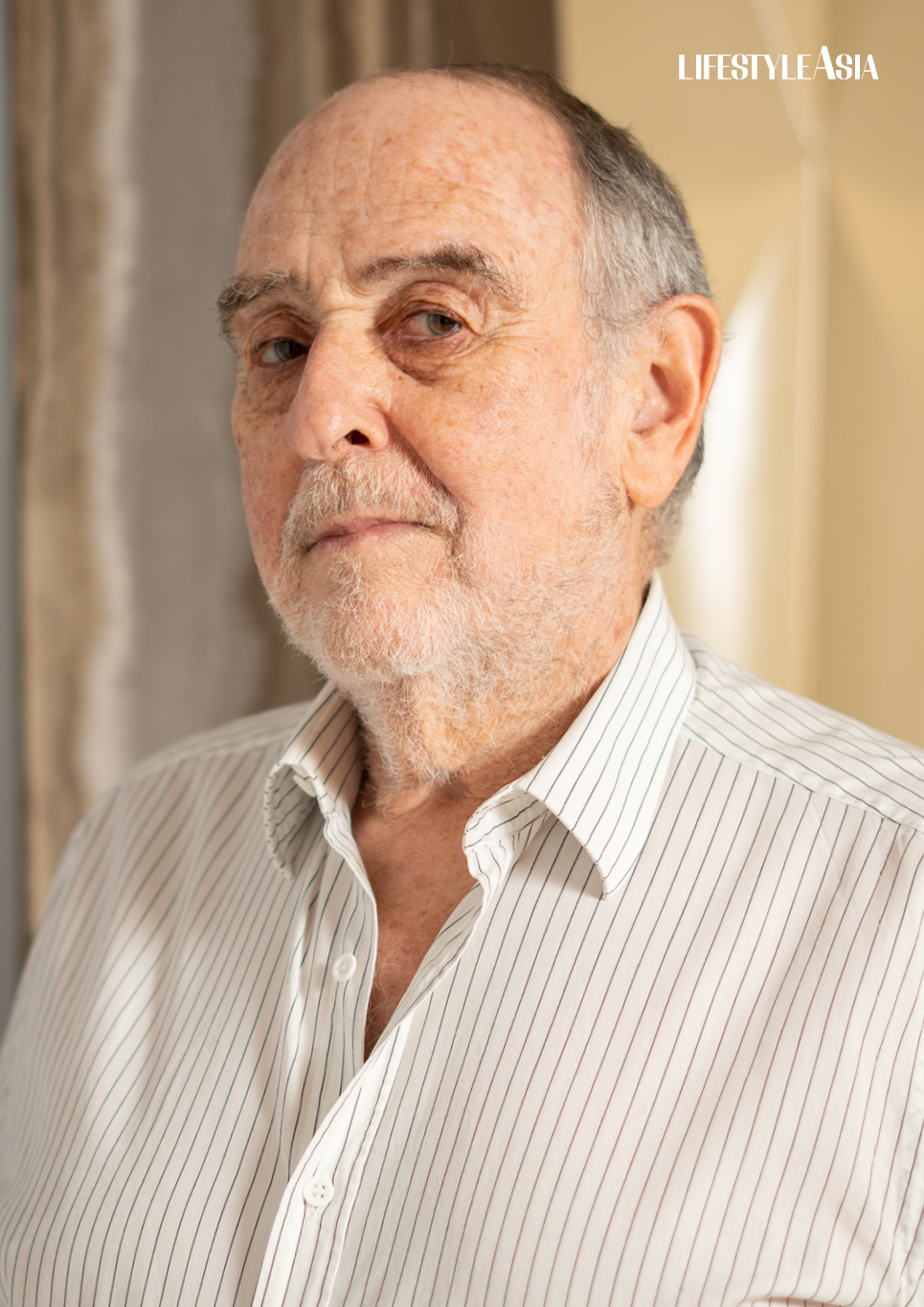Lifestyle Asia speaks with Miss Saigon co-creator and renowned composer Claude-Michel Schönberg, getting to know the maestro’s storied career and accomplishments.
Note: The following piece has maintained most of Schönberg’s original words (with minor corrections for better clarity) as a primarily French speaker communicating in English, to keep the piece as true to the interview as possible.
Everyone familiar with musical theater is familiar with Claude-Michel Schönberg. Renowned for his ability to weave intricate melodies with compelling narratives, Schönberg has left an indelible mark on the world of Broadway and beyond. Lifestyle Asia had the privilege to sit down with the maestro for a one-on-one interview.
Born in Vannes, France in 1944, he initially pursued a career in popular music before transitioning to musical theater. He wrote most of the music for France’s first rock opera La Révolution Française in 1973 where he played the role of King Louis XVI. He did not start there though. He says “I’ve been always working on songs and music…even the most prestigious singers that you can hear about, those are people who have been working for 10 years trying to get the job. So it’s not a spontaneous generation.”

READ ALSO: The Heat Is On: ‘Miss Saigon’ Cast Members Share Their Thoughts Ahead Of Manila Premiere
The first musical instrument he learned to play was the piano when he was around three years old. He narrates “I was a singer because I was living in a very remote town in France, far from Paris. And my mother asked me what I wanted to do because I lost my father when I was very young. And I told her I want to be a composer. So living such a big distance from Paris, [becoming a] composer that’s a crazy idea… he doesn’t make money. [She asked] ‘And what composer?’ I said an opera composer… It was even worse. So I had a big argument with her because we didn’t have any money. There was no music conservatory in my town. So I told her listen, I’m going to finish my study, my graduation. And once it’s finished, I do what I want and she said okay, so, when I keep going, I kept going during mathematics studies. I went to university. After I went to the commercial high school… I always wanted to stay in my region, because in the meantime, to have the kind of money because I didn’t have any money. I created a rock band. And we were touring the Brittany which is the region from where I come. Every weekend, every vacation to get some money and so we started to do music like that… I was writing songs for my band. And one night the main man came to me and told me ‘Do you want to come to work with me in Paris?’ And I said ‘who are you?’ and gave me his card? He was the guy… the CEO of EMI (EMI was a British transnational conglomerate founded in 1931 in London. At the time of its acquisition by Universal Music in 2012, it was the fourth largest business group and record label conglomerate in the music industry). So that’s how I started.”
One of Schönberg’s most iconic works is Les Misérables, the epic tale of love, redemption, and revolution set in 19th-century France. The Tony and Grammy award winning musical has become the sixth longest-running musical in history. Then he wrote another musical collaboration with lyricist Alain Boublil — Miss Saigon, which explores the tragic tale of a doomed romance amidst the turmoil of the Vietnam War.

Miss Saigon is now on its 35th year. Asked if it will ever be made into a movie, Schönberg says: “That there are many, many plans, but never done.” He reflects on its stage success saying “You know when a show like Les Misérables or Miss Saigon is becoming a big hit. A lot of people… they want to see it and they want to go back and see [it] because we are lucky enough not to be part of an art form that you can reproduce. A song, you can print it on the CD, can have a picture of a book, you can print it at a thousand editions. Live entertainment… you have to be there to understand what is the function of live entertainment. We have [a] beautiful video recording of Miss Saigon but it will never replace your presence in the theater with the experience of people acting in front of you, really singing. When you’re watching a movie of Miss Saigon you’re not going to give applause to the people on the screen. When you’re watching Miss Saigon on stage, you can give applause because it’s something happening in front of you at the very second.
Writing and composing with Boublil is a complete interaction. He says “The music goes with the lyrics, and the lyrics goes with the music as we are coming from the rock and roll because we used to write [those kind of] songs before. So I used to write music and Mr. Boublil was putting lyrics on some of my songs. We [are] working on the script, him and me, and it’s not the script with dialogue. It’s more description. Precise of what’s happening on stage – the story. So with describing the story we going to tell on the stage, and as I’m trying to write music on that precise description that we are doing of the story, and after Alain’s putting some lyrics on it but sometimes he can give me a phrase like “I dreamed a dream” so I have to deal with it. And I’m starting to write “I Dreamed a Dream” because that’s part of the inspiration. It’s very flexible, but that said, that 70% of the time, I’m starting by a musical melody, and he gives me music and that music, he gives me lyrics. And those lyrics are giving me some more inspiration for the rest of the song. It’s like a tennis table game; hence, to each other.”

Miss Saigon had several changes throughout its run on the West End and Broadway. “Too Much for One Heart” (which did not even make it to the original London production) was a solo by Kim which became “Please” — a duet by Kim and John when the show was staged. The current show features a combination of both “Too Much for One Heart” and “Please.” When Ellen and Kim finally met, the London show featured “Now That I’ve Seen Her,” but the same song with the words “It’s Her or Me” made it to the Broadway version. In this new production, the song was completely replaced by another song, “Maybe” which was introduced to the show in the 2014 London revival. When asked about song or lyric changes, the maestro says “Yes because a musical… you don’t write a musical… you rewrite always a musical, because a musical is something alive. So when you look at it and you feel that it’s not the right stuff, you can still rewrite it, which is not the case of a recording or removing. Everything is frozen. And we have a problem with the character of Ellen. We had a lot of problems. And the main problem is that you know because everything is copied on [Madama] Butterfly the opera and the opera version you’re listening to today, it’s not the original one. The original one was four acts… very long. And there was the third act happening at the consulate embassy in Nagasaki. Where Kate Pinkerton (the character Ellen is based on) came to see the consul and explain you know that butterfly (“Cio-Cio-san, the character Kim is based on), she’s saying that she’s married to my husband, but we come in here and we would like to take the child with us to go to the US or we don’t know if it’s fine, maybe we’ll give her money and she can still live here. And of course like in a very bad story. And it was too long. It was boring. After three days they have to take off the show. And Puccini spent one year to rewrite it to compress it in three acts and he scrapped completely the consulate act because it took her right there. She’s [Kate] the one…she stopped the beautiful story to exist. She’s the one that the audience doesn’t like. So we had a problem with that because the wife of Pinkerton, Kate, she’s only doing what a woman would do. She realized that her husband was already married even temporary ceremony in Japan, but she wants to have a child on their own. And she doesn’t want to live in a country with a Japanese girl practically living in their house and being the servant. And the story of Pinkerton too, it’s quite colonialist because he’s coming back to Japan, because you want to see the child and even to need to take the child with him. He doesn’t care about the girl and the fact that she loves him and they have been married [for a] few months together. He doesn’t care. For her, she was a puppet and [a] nice little puppet but that’s it. There is something of despise with human life. So we wanted to change it into a real love story. The origin of [Madama] Butterfly is a French novel called Madame Chrysanthéme, via a writer called Pierre Loti because he had the same experience of a temporary wedding in Japan, but only for a certain amount of time. And after he forgot about it and then he left he came back to France and that’s it, and obviously the Japanese girl was very in love with him.”

The Les Misérables movie had a beautiful new song not heard on stage, “Suddenly,” added to it. Schönberg says “We didn’t want to add a song but the director Tom Hooper was reading in the original book, a wonderful section we can’t put on stage. It’s when Jean Valjean (played by Hugh Jackman) is on his own for the first time with the little girl and this man who has been struggling, fighting people all his life. Suddenly he was feeling something for the child. And it was like a stroke for him… that suddenly feeling in his heart that he’s responsible for her. She’s totally trustful with him and it’s a big responsibility. And he started to feel that suddenly he’s falling in love with the child. So it’s on the screen you can do it on stage.” The things that could be done on screen that could not be done on stage was a close up shot of Jean Valjean lovingly holding the hand of Cosette or how he gazes into her eyes as a father who just gained a child. He adds “And so we wrote the song that he was asking us and of course because it was a new song it went to the Oscars that the competitors was Adele with ‘Skyfall’ so I knew that we had been writing a lullaby and she’s writing an atomic bomb song so we knew that we can win which it was fun to go to the Oscars I never imagined that I will go there one day.”
Asked if he’d do another musical, he said “Do you know how old I am?” He continues “I know everything. We do twice the same thing so between Les Miz and Miss Saigon, it was something different. Even between Miss Saigon and Martin Guerre, it was completely different. If I can work on the project I never did before in a format I never did before. If somebody asked me to create something for an opera I never did before maybe. But to redo [a] musical when I know all the rules and everything was going to happen. I’m not very enthusiastic. And on top of that the new format of musicals I believe in, it’s not at all my style because I can’t do, and then I can do all the new musical I love but it’s not my cup of tea. And in this world I’m a dinosaur, you know what that means? So I hope that one day somebody will do something big because that’s what we need for the moment. But in the format of the music and the show that happened today… I saw a wonderful play in London two weeks ago The Portrait of Dorian Gray [actually, The Picture of Dorian Gray] and it’s done with a full vision of what the theater can be in the future (The play is a one-woman play featuring actress Sarah Snook playing 26 characters). So to do a musical like that, yes, I would be interested, but to go all again through the process, the audition, the crisis, and other problem, frankly, I have been through. I survived… maybe one day.”

Les Misérables was originally written in French before it became an English musical and Schönberg reveals that “There is a French version of Miss Saigon because each time we finish a work, we’re doing a demo tape of the work where I’m playing a piano and singing everything. So that demo tape of Miss Saigon did exist. But as [producer] Cameron [Mackintosh] was so confident in the work, he decided to open directly at the Drury Lane. Even with no preview in the city around London. He was sure it’s going to work so he did it directly at the Drury Lane. But somewhere in my house, there is a tape of the French version of me singing.”
For the Les Misérables movie, he says “[director] Tom Hooper asked to have the original French tape I did to understand the drive and the energy of the show. Because on my tape there is always the right energy and the right drive.”
He closes about that drive and Miss Saigon saying “And what’s important when I see the show in Manila it’s the drive of the show. What bring[s] the show going forward? What part of the story have you tell it so the audience [would] want to know more?”
He lovingly says that without the Philippines, there would be no Miss Saigon. He recalled going around the world in search of a Kim and found a gold mine when he came to Manila to find so many Filipino talents. I thanked him for coming over and discovering Filipino talent for the world to see. He praised the talent of “a lot of Filipino singers… because we had met (the original Kim) Lea (Salonga), she was 16, we had Joanna Ampil… beautiful singers, wonderful girls.”
I couldn’t help but marvel at Schönberg’s enduring passion for his craft. I thanked him as he stood up and asked if the interview was clear enough despite his jetlag. I said it was perfect… just as perfect as how his two smash-hits have been restaged often enough to become classic musicals that have endured through time.
The new production of Miss Saigon is playing at The Theatre at Solaire until May 12, 2024. Go to https://premier.ticketworld.com.ph/shows/show.aspx?sh=MSSAIGON24 for tickets.
Photos by Kieran Punay of KLIQ, Inc. , edited by Paolo Torio.





